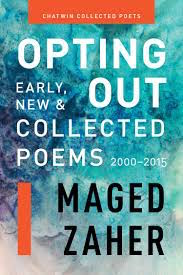Event of the Week: Opting Out Early Release Party
For over a decade now, Maged Zaher’s poems have bounced between Cairo and Seattle. Somehow, he’s bridged the revolutionary Arab Spring-era Middle East and the banal tech-centric cityscape of Seattle, finding the uneasy common ground between revolutionaries and middle managers. His poems are about the world, but they’re also very specifically rooted in space; Zaher has written some of the most Seattle-y poems you’ll ever read—about our notoriously difficult dating scene, about our tech-bro culture, about corporate blandness encroaching into the arts.
Zaher recently announced on Facebook that he’s about to make a big change: he’s moving to Atlanta for personal reasons. Wherever he finds himself, Zaher has agitated for a better world. In Seattle, he has called out the homogeneity of our overly conservative, lily-white poetry scene, and he’s paid the price for his truth-telling without complaint. Zaher understands that everything is political, and that apathy is less than worthless, so he takes his stands and throws his rhetorical bombs even if they cost him a little bit of local popularity every time. One of the greatest compliments I can give him is that some of Seattle’s worst people will breathe a sigh of relief when they learn he’s leaving town.

Early next year, Seattle publisher Chatwin Books is publishing a big new satisfying collection of Zaher’s work, titled Opting Out: Early, New, and Collected Poems (2000–2015). But to mark Zaher’s exodus, Chatwin is rush-printing a few copies of Opting Out to sell at a party in the poet’s honor this Saturday night. It will be your only chance to get your hands on a copy of the collection until February.
The free pre-release party, happening at Pioneer Square antiquarian bookshop Arundel Books at 7 pm, could very well be Zaher’s last public appearance before he heads east. Wine and champagne will be provided, and Zaher will read some of his poems. Maybe he’ll read some of the Egyptian poets he translated for the remarkable anthology he edited for Alice Blue Books, The Tahrir of Poems. Maybe he’ll throw a couple more barbs at deserving targets on his way out the door, by way of a candid speech or two.
The terrific thing about Zaher is that you never know exactly what’s going to happen until it’s already happened. As a poet, as a political animal, you can’t predict what he’ll do next — you can only respond to him. I don’t want to make him out to be too much of a renegade: much of the time, Zaher is perfectly polite and generous and kind, promoting the work of a poet he loves or telling a joke about life as an information architect that leaves the South Lake Union workers in the audience darkly chuckling along with him. Those performances are just as political, just as passionate, as the rare public appearances where he burns bridges. All art — all emotion — is political, and Zaher is one of our finest revolutionaries. This city will be smaller and less interesting without him.
Arundel Books, 209 Occidental Avenue S., 624.4442, http://arundelbooks.com Free. All ages. 5 p.m.